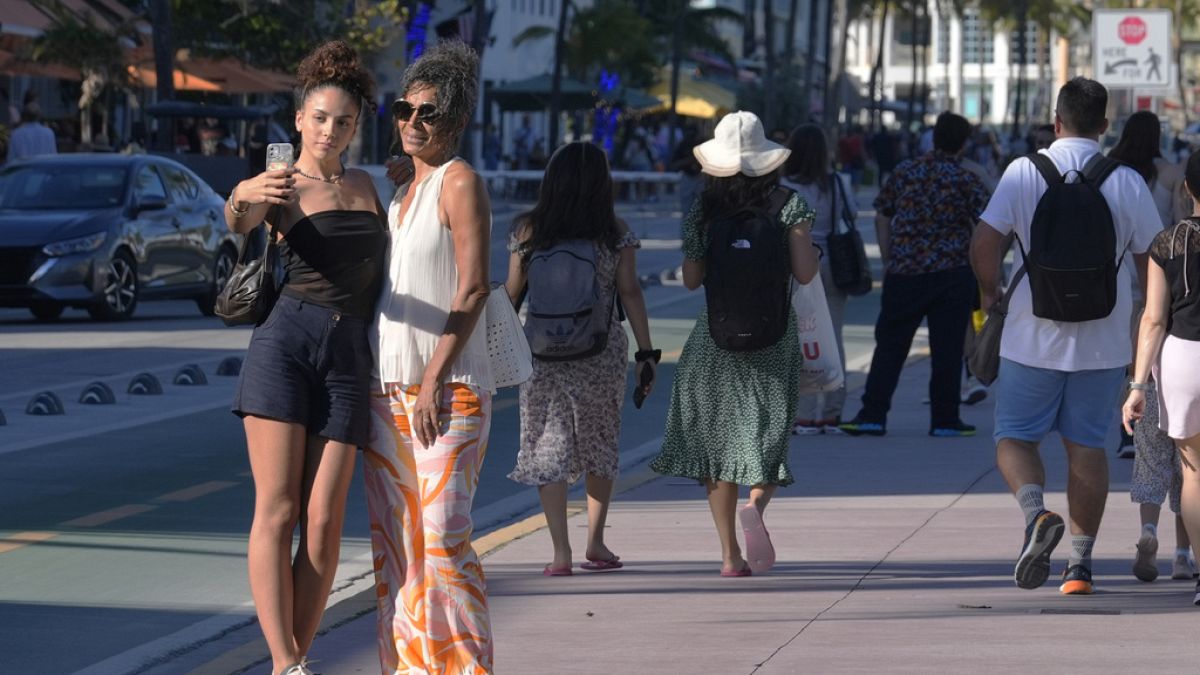Miami Beach in Florida is trying to break up with spring break - but it's not yet clear whether spring break will take the hint.
The destination is infamous for its popularity as a spring break must-visit. Spring break is time off from University that usually falls around Easter in the US and other countries. Miami Beach is one of the most popular destinations with students.
The rite of passage began in the mid-1930s, when a swimming coach from Colgate University in New York state took his team down to Florida for some early training at a brand-new Olympic-size pool in sunny Fort Lauderdale.
Other colleges followed suit and the tradition emerged into what it is today: American students catching some sun during their break from study.
However, Miami Beach seems to have had enough of the influx.
After three consecutive years of violent incidents, officials are implementing month-long security measures aimed at curbing the chaos, including parking restrictions for non-residents and closing cafes on the main drag on busy weekends.
The city has warned visitors to expect curfews, bag searches at the beach, early beach closures, DUI checkpoints - as well as arrests for drug possession and violence.
What does the potential ban mean for Miami Beach residents and visitors?
Business owners in the city’s world-famous South Beach neighbourhood are now concerned, though, that they'll lose money during one of the busiest times of the year.
Some civil rights advocates are also claiming that the restrictions are an overreaction to large Black crowds.
Many of the city's restrictions aren't new, but in past years, they were instituted as emergency measures during the unofficial spring break holiday - not measures put in place ahead of time.
“The status quo and what we’ve seen in the last few years is just not acceptable, not tolerable,” Miami Beach Mayor Steven Meiner said last month.
Meiner said crowds have become unmanageable despite a robust police presence. He added the city, which is situated on a barrier island across the bay from Miami, can only hold so many people - and that capacity has often exceeded what's safe for both visitors and residents during the break.
Most spring break activity centres around a 10-block stretch of Ocean Drive known for its art deco hotels, restaurants and nightclubs.
David Wallack, owner of Mango’s Tropical Cafe, said Miami Beach has always thrived on celebration, and choking visitor access will turn the vibrant, eclectic city into a retirement community.
“I believe we need to create something big, another big event in March because March has fallen off the edge of the cliff,” Wallack told AP.
Wallack and other locals have proposed a large music festival during the third week of spring break - when aimless and unruly crowds tend to reach their climax - with the hope that attendees will disperse the loitering mobs.
Meiner, however, claimed the city has spent millions of dollars on concerts and other events in the past with little effect in mitigating the violence.
He added that businesses suffer when violent mobs gathering along Ocean Drive force them to close, adding that the people who are primarily causing the problems aren't spending money in the city anyway.
“They’re not staying in the hotels,” Meiner said. “They’re not visiting our businesses.”
Why do civil rights activists think the changes are racially motivated?
Some civil rights advocates maintain that the restrictions are simply racially motivated.
South Beach became popular among Black tourists about two decades ago as promoters organised Urban Beach Week during the Memorial Day weekend.
Many locals have complained about violence and other crime associated with the event, which led to an increased police presence - but the event’s continued popularity correlates to a bump in Black tourism throughout the year.
Stephen Hunter Johnson, an attorney and member of Miami-Dade’s Black Affairs Advisory Board, said city officials are only cracking down so hard because many of the visitors are Black.
“Everybody loves this idea that they are free from their government intruding on them,” Johnson said. “But amazingly, if the government intrudes on Black people, everyone’s fine with it.”
Miami Beach’s mayor rejects the notion that the city's actions have anything to do with race.
“I have a moral obligation to keep people safe, and right now, it is not safe,” Meiner said.
What is the spring break situation in the rest of Florida?
Also in Florida, the longtime spring break destination of Panama City Beach has experienced a similar escalation in violent crime over the holiday - but officials say it’s not down to students.
Police Chief Eusebio Talamantez instead attributes that to people taking advantage of the environment.
“When you think of spring break, you might think of vacation, a collegiate break, maybe some fistfights and some keg stands,” Talamantez said, “It has evolved into shootings, mass riots, rape and homicide.”
Panama City Beach's violence came to a head in 2015 when a house party shooting left seven people wounded. The city subsequently banned alcohol on the beach and cracked down on unpermitted events.
Local businesses sued the city later that year, claiming the new rules unfairly targeted events popular with Black visitors, but the lawsuit was dropped several months later.
Talamantez said the measures were somewhat successful, but a massive hurricane in late 2018 and COVID-19 lockdowns in 2020 disrupted the city's ability to manage crowds once pandemic restrictions were lifted, leading to a resurgence in the violence.
A renewed crackdown in 2023, however, led to a 44% reduction in crime - and the city is imposing similar rules this year. Talamantez said he doubts anything Miami Beach is doing will be more strict than the enforcement measures in Panama City Beach.
“We’re just trying to create an environment that says loud and clear in big bold letters that we are a municipality of law and order," Talamantez said. "And law and order does not go away just because you’re on spring break.”


